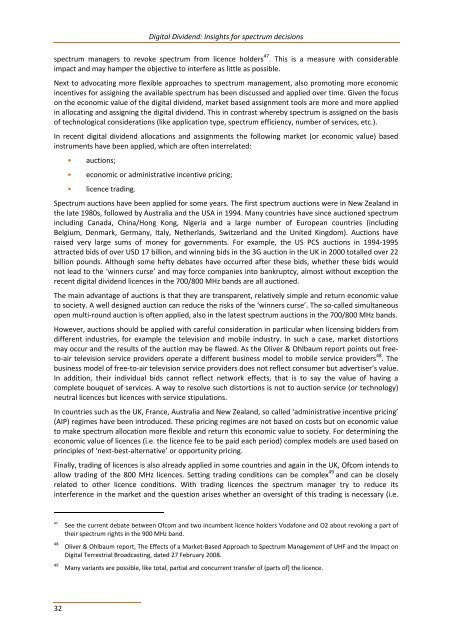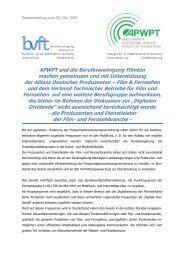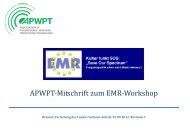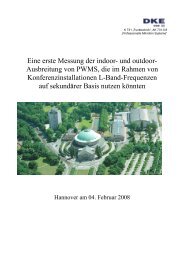Digital Dividend: Insights for spectrum decisions - ITU
Digital Dividend: Insights for spectrum decisions - ITU
Digital Dividend: Insights for spectrum decisions - ITU
- No tags were found...
Create successful ePaper yourself
Turn your PDF publications into a flip-book with our unique Google optimized e-Paper software.
<strong>Digital</strong> <strong>Dividend</strong>: <strong>Insights</strong> <strong>for</strong> <strong>spectrum</strong> <strong>decisions</strong><strong>spectrum</strong> managers to revoke <strong>spectrum</strong> from licence holders 47 . This is a measure with considerableimpact and may hamper the objective to interfere as little as possible.Next to advocating more flexible approaches to <strong>spectrum</strong> management, also promoting more economicincentives <strong>for</strong> assigning the available <strong>spectrum</strong> has been discussed and applied over time. Given the focuson the economic value of the digital dividend, market based assignment tools are more and more appliedin allocating and assigning the digital dividend. This in contrast whereby <strong>spectrum</strong> is assigned on the basisof technological considerations (like application type, <strong>spectrum</strong> efficiency, number of services, etc.).In recent digital dividend allocations and assignments the following market (or economic value) basedinstruments have been applied, which are often interrelated:• auctions;• economic or administrative incentive pricing;• licence trading.Spectrum auctions have been applied <strong>for</strong> some years. The first <strong>spectrum</strong> auctions were in New Zealand inthe late 1980s, followed by Australia and the USA in 1994. Many countries have since auctioned <strong>spectrum</strong>including Canada, China/Hong Kong, Nigeria and a large number of European countries (includingBelgium, Denmark, Germany, Italy, Netherlands, Switzerland and the United Kingdom). Auctions haveraised very large sums of money <strong>for</strong> governments. For example, the US PCS auctions in 1994-1995attracted bids of over USD 17 billion, and winning bids in the 3G auction in the UK in 2000 totalled over 22billion pounds. Although some hefty debates have occurred after these bids, whether these bids wouldnot lead to the ‘winners curse’ and may <strong>for</strong>ce companies into bankruptcy, almost without exception therecent digital dividend licences in the 700/800 MHz bands are all auctioned.The main advantage of auctions is that they are transparent, relatively simple and return economic valueto society. A well designed auction can reduce the risks of the ‘winners curse’. The so-called simultaneousopen multi-round auction is often applied, also in the latest <strong>spectrum</strong> auctions in the 700/800 MHz bands.However, auctions should be applied with careful consideration in particular when licensing bidders fromdifferent industries, <strong>for</strong> example the television and mobile industry. In such a case, market distortionsmay occur and the results of the auction may be flawed. As the Oliver & Ohlbaum report points out freeto-airtelevision service providers operate a different business model to mobile service providers 48 . Thebusiness model of free-to-air television service providers does not reflect consumer but advertiser’s value.In addition, their individual bids cannot reflect network effects, that is to say the value of having acomplete bouquet of services. A way to resolve such distortions is not to auction service (or technology)neutral licences but licences with service stipulations.In countries such as the UK, France, Australia and New Zealand, so called ‘administrative incentive pricing’(AIP) regimes have been introduced. These pricing regimes are not based on costs but on economic valueto make <strong>spectrum</strong> allocation more flexible and return this economic value to society. For determining theeconomic value of licences (i.e. the licence fee to be paid each period) complex models are used based onprinciples of ‘next-best-alternative’ or opportunity pricing.Finally, trading of licences is also already applied in some countries and again in the UK, Ofcom intends toallow trading of the 800 MHz licences. Setting trading conditions can be complex 49 and can be closelyrelated to other licence conditions. With trading licences the <strong>spectrum</strong> manager try to reduce itsinterference in the market and the question arises whether an oversight of this trading is necessary (i.e.474849See the current debate between Ofcom and two incumbent licence holders Vodafone and O2 about revoking a part oftheir <strong>spectrum</strong> rights in the 900 MHz band.Oliver & Ohlbaum report, The Effects of a Market-Based Approach to Spectrum Management of UHF and the Impact on<strong>Digital</strong> Terrestrial Broadcasting, dated 27 February 2008.Many variants are possible, like total, partial and concurrent transfer of (parts of) the licence.32






